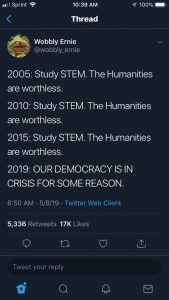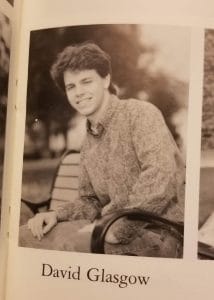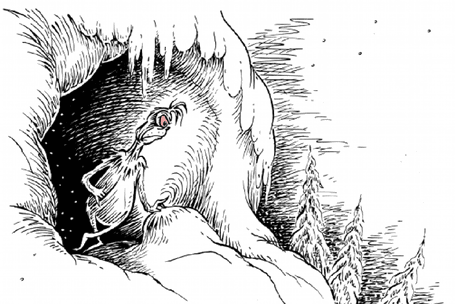
And then today, coincidentally, after the videos arrived, a Twitter screenshot started making the rounds of social media today with the following characteristically concise message:
2005: Study STEM. The Humanities are worthless.
2010: Study STEM. The Humanities are worthless.
2015: Study STEM. The Humanities are worthless.
2019: OUR DEMOCRACY IS IN CRISIS FOR SOME REASON.
The tweet just underscored for me a common thread that I saw in my students’ testimonials, and that I had earlier reflected on as I was preparing the program book for this year’s event. Here’s what I said in my introduction to that book:
Some people work every day to make the world a better place. Doctors and lawyers, novelists and journalists, ministers and folks who run non-profit service agencies. They cure disease and feed the hungry and promote intelligent discourse in a world that badly needs it. The things they accomplish every week are enviably important.
Me? I teach music. I tell pianists to curl their fingers more and loosen their wrists. I tell singers to raise their soft palates and engage their abs. If you get stuck focusing on the “what” and the “how” of music-making, it can seem… unimportant.
That’s why today is such an important day for me.
Today is about the “why.” Today I get to be present as my students—the finger-curlers and wrist-looseners and soft-palate-raisers and ab-engagers—bravely put themselves before a group of strangers, and they make them feel things.
How often are policy decisions made based on cold-facts profit-and-loss statements? Heartless laws written—and compassionate laws blocked—because the people they impact are safely ensconced in statistics, stereotypes, and anonymity? What would our world look like if our society valued and prioritized the universal humanness of delighted laughter and sympathetic tears… of contented sighs and compassionate groans… the universal humanness of feeling?
The folks who make music for you today may never end up at Carnegie or on Broadway. They may spend their days as mathematicians or chemists, office workers or executives. Their careers may not have anything to do with music. But as long as they continue to practice and model the courage it takes to feel, and they help others to do the same, I believe to my core that every day of their lives, they will make the world a better place.
I am so proud of the feelings my students discover during their work, and evoke in others. It’s a tremendous honor to be present when students expand their boundaries of vulnerability and summon the courage to reveal their deep-seated human-ness, whether it’s in the safe privacy of the lesson studio or in the public space of the stage. Artists are brave, brave people, and their bravery is the best kind: the artist’s bravery is the kind that, rather than threatening or insisting or boasting, invites the rest of the world to join in, to take a risk, and to be brave together.
Honestly, I think that kind of bravery is the only hope our world has right now.
So, what brave art have you made today?





Recent comments